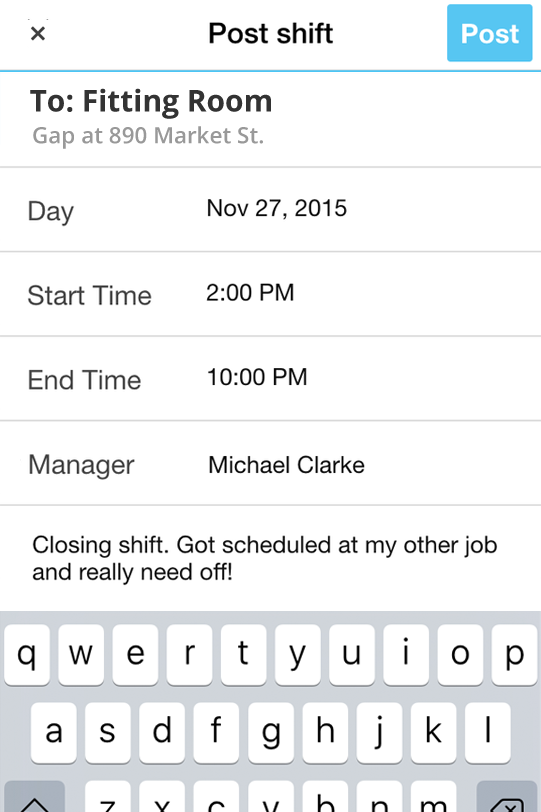
For many American workers, this is a short week, one that ends in the reward of one or two days off work, a big meal, and time spent with friends and family. But for retail workers, this weekend is the kickoff of a nearly two-month-long slog through the holiday season: last-minute shifts, packed stores, frenzied customers.
A big part of that is on-call shift scheduling, in which staff are required to be available for shifts that can be canceled at any time with no pay. Recently, in response to criticism of the practice, retail behemoths including Abercrombie & Fitch, Victoria's Secret, and Gap have abandoned the practice. Gap Inc. in particular has partnered with the University of California Hastings College of Law on a study aimed at finding solutions to the harried nature of retail work, year round. Researchers will spend nine months observing the effects of policies, such as a mandatory two-week advance on schedules, on workers.
One thing the Gap thought might help is making it easier for workers to communicate with one another. White-collar workers are accustomed to having corporate email accounts that hook into messaging applications like Slack or HipChat, giving them constant — maybe even too much — access to their colleagues. But aside from long, often confusing group text messages on personal phone numbers, there's really no equivalent for people who work in places like restaurants.
That's a problem that ShiftMessenger has been trying to solve since the company emerged from Y Combinator last year. Today, the company is announcing a partnership with 30 Gap stores in Chicago and San Francisco to see whether its technology can help retail workers — 1,300 of them — get through the holiday season with a little less stress. ShiftMessenger, a WhatsApp-type app that allows co-workers to post and pick up unwanted shifts as well as share pictures and chat, has already made adjustments to its product to coordinate better with Gap. Last week, it rolled out a groups function that separates different job types.


ShiftMessenger, which raised $1.5 million earlier this year and is based out of the Runway Incubator in Twitter's building on Market Street, is already used by tens of thousands of retail and restaurant workers at companies such as Panera, CVS, and Starbucks, according to CEO and founder Austin Vedder. Because the app doesn't look like "enterprise software rolled out by corporate," he said, it's easy for workers to pick up quickly. Sixty percent of people who use it, Vedder said, will use it again the next day. "It's part of their work life," he told BuzzFeed News.
Carrie Gleason, director of the Fair Workweek Initiative, said the idea of shift-swapping is not new. Workers have been forming ad hoc groups on Facebook for this purpose for some time; Starbucks employees in San Francisco communicate this way, for example, as do Abercrombie employees in New York. Relying on familiar platforms, like Facebook, rather than asking people to download a new app, makes sense because "the challenge is making sure enough workers are on them," Gleason told BuzzFeed News.
Companies that make legacy scheduling software, including Kronos and Workplace Systems, have also been working on incorporating employee-driven shift-swapping features into their software. Gleason argued that, while products like Shift Messenger are helpful, they can be even more useful for employers to be able to gather data about employee behaviors from software that's directly integrated with the company.
Making working conditions for retail and other low-wage workers better is probably not something that will be solved by technology. Airport workers became the latest contingency today to join the Fast for $15 movement, in which low-wage workers are refraining from eating to promote the campaign for a higher minimum wage — a campaign that could have a much greater impact on low-wage workers' lives than any app. But even so, Shift Messenger and its ilk are undoubtedly part of making work-life balance a concept that doesn't just apply to salaried jobs, but to baristas and busboys and retail workers as well.
